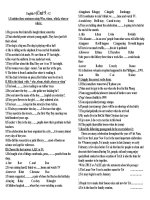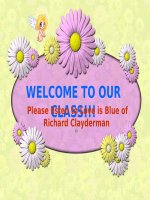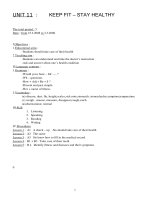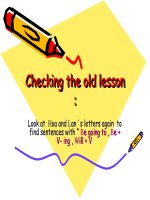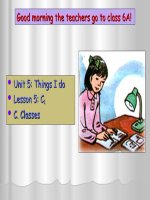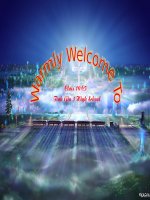english9 - unit 6
Bạn đang xem bản rút gọn của tài liệu. Xem và tải ngay bản đầy đủ của tài liệu tại đây (213.45 KB, 15 trang )
Week: 19 Preparing day: 13/ 01/ 07
Period 37 Teaching day: 16/ 01/ 07
Unit 6 the environment
getting started & listen and read
I. Objectives: By the end of the lesson, students will be able to know more
about the environments and the solutions.
- Skills: listening, speaking, reading, writing
- Education: To keep our school clean
II- Language contents:
+ Vocabulary : about the environment.
+Grammar: conditional sentences (type 1), Adverb clauses of reason.
III.Techniques : questions- answer, brainstorming pair/ group work.
IV.Teaching aids : E9, pictures, tape.
-Time: 45
V.Procedures
T &Ss activities Contents
1/ Warm up:
-T: ask Ss to think of the environmental
problems in the city.
-T: Write down their ideas.
2/ Presentation: (7)
- T asks Ss to look at the six pictures on
page 47 in their text books, elicits the
new words
T: read.
-St: repeat.
Ss: copy down.
-T: check. (rub out remember)
- T asks them to match the words in the
box with the correct pictures.
-T: correct
*T: ask Ss to keep the books closed
-T: introduce the situation of the text.
Mr brown is talking to some volunteer
conservationists
-T: ask Ss to guess the place.
-T: feed back.
Air pollution
Smoke from cars
Dirty street
Water pollution
I/ Getting started:
Match these environmental problems to the
pictures
a/ air pollution: ô nhiễm không khí
b/ spraying pesticides: phun thuốc trừ sâu
c/ garbage dump: bãi rác thải
d/ water pollution: ô nhiễm nguồn nớc
e/ deforestation: phá rừng
f/ dynamite fishing: đánh cá bằng thuốc
nổ
II/ Listen and read:
1/ Vocab:
- rock (n) : đá
- garbage (n) : rác thải
- dump (n): bãi đồ, nơi chứa
- be disappointed : thất vọng
- pollution (n) : sự ô nhiễm
- garbage dump: ng rỏc
- sewage (n) nc thi
2/ Guessing:
Giỏo ỏn 9 Ngo thi Hanh
environment
problems in
our city
3/ Practice:(15’)
*T: asks Ss to read the text
and match the names in column A with
the activities in column B (pair work)
* T: ask Ss to read the text and answer
the questions (pair work)
-T: feed back..
*Ss: write the answers on the board.
- T: correct
-T: take note the grammar.
-Ss: pick out the conditional sentences.
-T: explain about the tense.
4/Production: (5’)
- Discuss the question f & g
-T: ask to say about the environmental
problems in their city and some
solutions to solve (What should we do to
protect the environment)
5/ Home work: (5’)
-T: give the homework
-Ss: copy down
Where are they going to work?
-The conservationists are going to clean
the beach.
3/ Matching: (key )
G1: f
G2: e
G3: b
Mr Jones – a
Mrs Smith – c
Mr Brown – d
4/ Answer the questions:
a/ The speaker is Mr Brown.
b/ The listeners are the volunteer
conservation sts.
c/ They are on the beach.
d/ They are going to clean the beach.
e/If they work hard today, they will make
the beach clean and beautiful again.
5/ Grammar:
*Conditional sentence: (type I)
-If you can’t find your place, I will help
you.
- If we work hard, we’ll make this beach
a clean and beautiful place again.
* Adverb clauses of reason (as)
* Discuss:
f/ Yes have, I clean our school/ the street.
g/ If the pollution continues, the
environment around us won’t be good
and it will be harmful to our health, our
life.
5/ Home work: (5’)
-Write some environmental problems
and the solutions.
- Prepare: speak (persuade your friends
to protect the environment)
D/ Remarks…………………………………………………………………
………………………………………………………………………………
Week: 19 Preparing day: 13/ 1/ 07
Period 38 Teaching day: 17/ 1/ 07
Unit 6 the environment
Speak
A. Objectives: By the end of the lesson, students will be able to persuade their
friends to protect the environment.
-Skill: Developing speaking skill
Giáo án 9 Ngo thi Hanh
- Education: To keep our school clean
B - Language contents:
+ Vocabulary: about protecting the environment.
+Grammar: If clause
Why don’t you....?
What about + V-ing ?
-Techniques: pair, group, eliciting, ask- answer.
-Teaching aids: E9, picture.
-Time: 45’
C/Procedures
T’s-Ss’ activities Contents
1/ Warm up:(5)’
-T: introduce the task
-T: divide the class intro two teams
ss from two teams go to the board
and write the correct words the team
which writes more correct words
first wins the game.
2/ Pre-speaking: (10’)
-T: teach vocab by giving examples
mine, pictures, realia….
-Drill pronunciation.
check. Rub out- remember
*T: ask sts to complete the
expressions in column A by Using
one of the lines in column B cross
check.
-Ss: match the lines in column B
with an expression in column A so
that they have sentences of
persuasion.
3/ While- speaking: (15’)
-Students call out one of their
sentences until all sentences are
finished.
-T: ask ss to work in pairs and ask
and answer.
-T: give feedback.
-T: write some possible answers on
the board.
-Sts: practice.
-T: check + correct.
-Sts: present before the class.
*Jumbled words:
a/ beaargg = garbage
b/ lupotion = pollution
c/ tedaymin = dynamite
d/ paispoidednt = disappointed
e/ uaderpse = persuade
1/ Vocabulary:
- prevent (v) ngăn chặn
- reduce (v) giảm
- wrap (v) bao bọc
- faucet (v) vòi nước
- leaf – leaves : lá
* Matching:
Form
I think you should
Won’t you
It would be better if you
Can I persuade you to
why don’t you
Why not
What about / how about + Ving
Use: Express persuasion.
Ex: I think you should use banana
leaves to wrap food.
Won’t you use banana leaves to wrap
food?
* Ask- answer:
a/ How can we save paper?
* I think you should recycle used paper,
news papers.
* Why don’t you use banana leaves for
wrapping?
b/ How can we use fewer plastic bag?
What about cleaning and reusing them.
c/ How can we reduce water pollution?
It would be better if you don’t throw
Giáo án 9 Ngo thi Hanh
*Post- speaking(10’)
- Sts: discuss “what do you do to
protect the environment?” (group
work)
Sts present before the class.
-T: correct.
* (5’) Home work:
-T: give the homework
-Ss: copy down
garbage bins in to streams, rivers.
d/ How can we prevent littering?
Why don’t you throw all garbage in
waste bins.
e/ How can we reduce air pollution?
Can I persuade you to go to school by
bike?
f/ How can we reduce the amount of
garbage we produce?
Won’t you try to reuse and recycle
things.
*Home work:
- write the way to protect the
environment.
- Prepare for: part 4 Listen
( environment problems)
D/ Remarks:……………………………………………………………………….
……………………………………………………………………………………
Week: 20 Preparing day: 16/1/07
Period: 39 Teaching day :23/1/07
Unit 6: the environment
Listen
A/ Objectives: By the end of the lesson , ss will be able to listening for the main
content of the lesson to complete the note, they will know more about the
environment problem and the way to produce.
-Skill: Developing listening skill
-Education: To protect our environment
B/ Language contents:
* Vocab: raw, sewage, oil spills, drop...
* Grammar: adjectives and adverbs
-Techniques: chatting, eliciting, questions & answers, pair/group work
Giáo án 9 Ngo thi Hanh
- Teaching aids: cassette, pictures & sub- boards.
- Time : 45 mins
C/ Procedures:
T & Ss' activities:
- Warm up: (5')
T : ask questions Ss : answers
-chatting about the reasons why
ocean is polluted
- Ss say what they knew
- T teaches Ss some new words
4/ (35')
-Pre-listening:
* T sets the task of the exercise
- T introduces the notes , new
words,and the content of the tape
transcript:" You're going to listen
to the the report on how our
oceans are polluted. Then
complete the notes
- T asks Ss to study the notes and
guess the reasons
-While –listening:
* 1st listening & fill in the notes
- 2nd listening & checking the key
- cross check
- public key
* T corrects the mistakes & gives
the correct answers
Contents
*Checking –up
a.How can we save paper ?
b.How can we prevent littering ?
c.How can we reduce the amount of garbage
we produce ?
Key :
a.write on both sides of the paper; recycle
used paper,newspapers ( 4pts)
b.why don’t you throw all garbage in waste
bins (3pts)
c.won’t you try to reuse and recycle waste
things (3pts )
** chatting about how oceans are polluted
+ Do you know how oceasn are polluted ?
4/ Listen
- raw sewage (n): níc th¶i cha qua xö lý
- pump (v): b¬m
- vessel (n): tµu lín
-oil spills (n)sự tràn dầu
KEY:
Secondly: garbage is…
Thirdly:… come from ships at sea.
Next: Waste materials come from factories.
Finally: Oil is washed from the land.
TAPE TRANSCRIPT:
Our oceans are becoming extremely polluted.
Most of this pollution comes from the land,
which means it comes from people. Firstly,
there is raw sewage, which is pumped directly
into the sea. Many countries, both developed
and developing, are guilty of doing this.
Secondly, ships drop about 6 million tons of
garbage into the sea each year. Thirdly, there
are oil spills from ships. A ship has an
accident and oil leaks from the vessel. This
not only pollutes the water, but it also kills
marine life. Next, there are waste materials
from factories. Without proper regulations,
factory owners let the waste run directly into
the rivers, which then leads to the sea. And
finally, oil is washed from the land. This can
be the result of carelessness or a deliberate
dumping of waste.
Giáo án 9 Ngo thi Hanh
-Post –listening:
*T : ask questions -Ss :answer
-* T reminds Ss of the new words
of the lesson
* Questions
a.Where does the ocean pollution come
from ? (people)
b.What is pumped directly into the sea ?
( raw sewage )
c.How many tons of garbage is dropped into
the sea each year ? ( about 6 million tons )
d.What will happen if a ship has an accident?
( oil spills)
e.How can we prevent the ocean pollution ?
* Homework:(5') -Learn your lesson by hear
- Prepare 5 ( about the problems of pollution )
*Remark and marks:……………………………………………………………
Week: 20 Preparing day: 19.1.07
Period 40 Teaching day: 24.1.07
Unit 6 the environment
5. READ (p 51 )
I . Objectives: By the end of the lesson, students will be able to understand a
poem about the environment.
- Skill: reading comprehension
-Education: protect the environment
II - Language contents:
+ Vocabulary : junk yard, treasuse, hedge, nonsense, foam.
+Grammar: conditional- sentence.type 1
III.Techniques : chatting, questions- answer, matching.
IV.Teaching aids : E9, sub- board
-Time: 45’
V .Procedures
T & Ss’ activities Contents
1/ Warm up:(5)’
*-T: ask Ss some questions about the
ocean pollution
Ss :answer
.*T & Ss talk about poet
+ Do you like poetry?
+ Which poet do you like best?
+ Have you ever read an English
poem? Do you understand it?
* Checking –up :
a.Where does the ocean pollution
come from ? (people)
e.How can we prevent the ocean
pollution ?
Key :
a. people (3pts )
b. It’s up to Ss. One correct idea
(2pts )
* Chatting :
Giáo án 9 Ngo thi Hanh

